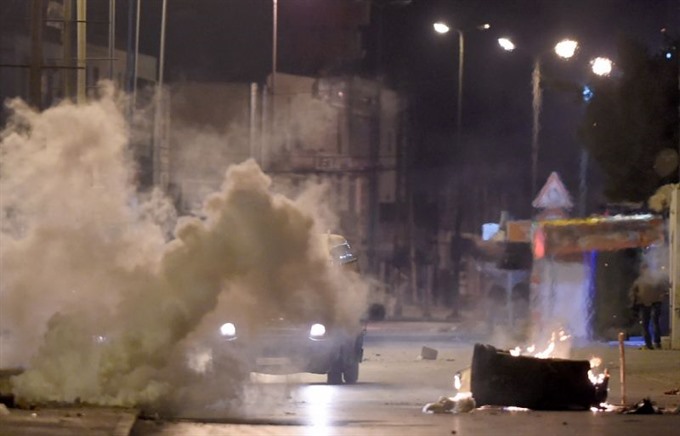 World
World

Sporadic unrest continued to shake parts of Tunisia on Thursday, as authorities said more than 600 people had been arrested in a week of protest as anger at austerity measures boils over on the streets.
 |
| A tyre is seen burning in the Ettadhamen neighbourhood on the outskirts of the Tunisian capital Tunis late on January 10, 2018. — AFP/VNA Photo |
TUNIS — Sporadic unrest continued to shake parts of Tunisia on Thursday, as authorities said more than 600 people had been arrested in a week of protest as anger at austerity measures boils over on the streets.
Tunisia, whose 2011 revolt sparked the Arab Spring, has been convulsed with sometimes violent demonstrations since late Monday that have seen protesters clash with security forces and left dozens injured.
The North African country is seen as a rare success story of the uprisings seven years ago that toppled autocrats across the region, but its failure to tackle poverty and unemployment have stirred economic resentment.
In the latest violence young people in the northern town of Siliana hurled rocks and Molotov cocktails at security forces, who responded with tear gas, an AFP correspondent said.
Police detained 328 people on Wednesday for theft, looting, arson and blocking roads, the interior ministry said on Thursday, after arresting more than 280 people over the previous two days.
Ministry spokesman Khalifa Chibani said the violence was less intense than in previous days.
Twenty-one members of the security forces were injured, according to Chibani, who said no civilians were hurt.
AFP correspondents said most areas were calm late Thursday, and the presidency said the main political parties, unions and business organisations will meet on Saturday to discuss the situation.
Tunisia is often seen as having had a relatively smooth transition since the 2011 uprising that toppled long-time dictator Zine El Abidine Ben Ali.
But Tunisians have expressed frustration since the start of the year over austerity measures expected to further increase prices in a struggling economy.
The country has introduced hikes in value-added tax and social contributions as part of a tough new budget.
Activists campaigning against the austerity measures have called for a huge protest on Friday.
Political scientist Olfa Lamloum called the measures "the straw that breaks the camel’s back".
"Young people are disappointed with the revolution, especially because of the high cost of living," she said.
’Nostalgia spreading’
Lamloum pointed to "deepening social inequalities" highlighted by official figures showing rising poverty, unemployment and illiteracy, particularly among young people.
In Tebourba, where a man died during the first unrest overnight Monday to Tuesday, the mood was grim.
"The political class is responsible for all this," said teacher Fatma Ben Rezayel in Tebourba on Thursday. "The region is totally marginalised."
She deplored that "unemployed young people fed up with their poor lives" were being branded criminals by the authorities.
The unrest started with peaceful protests last week, but escalated into clashes with police overnight Monday to Tuesday.
Unrest hit several areas including the central city of Kasserine, and Siliana, Tebourba and Thala in the north.
Scuffles also broke out in some Tunis neighbourhoods.
On Thursday, several dozen unemployed people protested in the central town of Sidi Bouzid, the cradle of the protests that sparked the 2011 uprisings.
In Kasserine, youths tried to block roads with burning tyres and hurled stones at police, another AFP correspondent said.
The main police station in the northern town of Thala was also torched, Chibani said. — AFP




